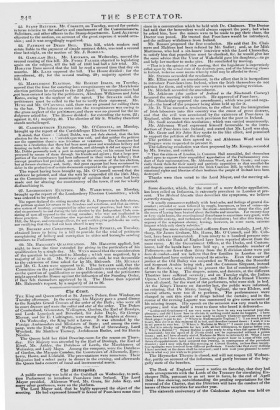airtrupolit.
A public meeting was held at the Guildhall on Wednesday, to peti- -tion Parliament to introduce Poor-laws into Ireland. The Lord Mayor presided. Alderman Word, Mr. Grote, Sir John Key, and many other gentlemen, were on the platform. • The Lord. Mayor said, that he highly approved the object of the meeting. He had expressed himself in favour of Poor-laws some time
since in a conversation which he held with Dr. Chalmers. The Doctor had said that the benevolent would always support the poor ; but when he asked him, -tow the misers were to be made to pay their share, the Doetor.was posed. He trusted that Poor-laws would be introduced, and the military withdrawn from Ireland. Mr. Rosson proposed the first resolution. He said that Dr. Chat: mers and Malthus had been refuted by Mr. Sadler ; and, as for Mifs Martineau, who had a six-hours' interview with the Lord Chancellor, to satisfy him that population must be checked, tke. he would give her the same advice that the Vicar of Wakefield gave his daughter,—to go and help her mother to make pies. He concluded by moving, " That it is the opinion of this meeting, that the Legislature is imperatively called upon by the actual state of the destitute poor, cud of the labouring classes in Irelaud, to devise some means whereby relief may be afforded to them."
Mr. Stevens seconded the resolution.
Mr. Elliot moved an amendment, to the effect that it is inexpedient to introduce Poor-laws into Ireland, when the Irish themselves do not petition for them, and while our own system is undergoing revision. Dr. Mitchell seconded the amendment.
Mr. Atkinson (the author of Ireland in the Nineieenth. Century) favoured the meeting with a speech. He approved of Poor-laws.. Mr. Shoobridge opposed the amendment ; which was put and. nega- tived—the hand of the proposer being alone held up for it.
Mr. 1). Wise moved a resolution, to the effect that the immigration of Irish labourers into this country was the cause of great distress,. and that the evil was occasioned by the existence of Poor-laws in England, while there was no such provision for the poor in Ireland.
Mr. Seidl seconded this resolution ; which was carried unanimously> Mr. Alderman Word expressed himself favourable to the intro- duction of Poor-laws into Ireland ; and stated that Mr. Lyall was also.
Mr. Grote and Sir John Key spoke to the like effect, and promised. to support the petition of the meeting.
The petition was then agreed to ; and Alderman Word and his colleagues were requested to present it. The following resolution was then proposed by Mr. Knapp, seconded by Mr. Swaine, and carried.
" That the citizens of London, in Common Hall assembled, feel themselves called upon to express their unqualified 'approbation of the Parliamentary con- duct of their representatives, Mr. Alderman Wood, and Mr. Grote; and espe- cially thank them for their manly and patriotic opposition to that uncalled-for and 'despotic measure denominated the Irish Coercion Bill, by which the con- stitutional rights and liberties of their brethren the people of Ireland have been.. destroyed."


















 Previous page
Previous page